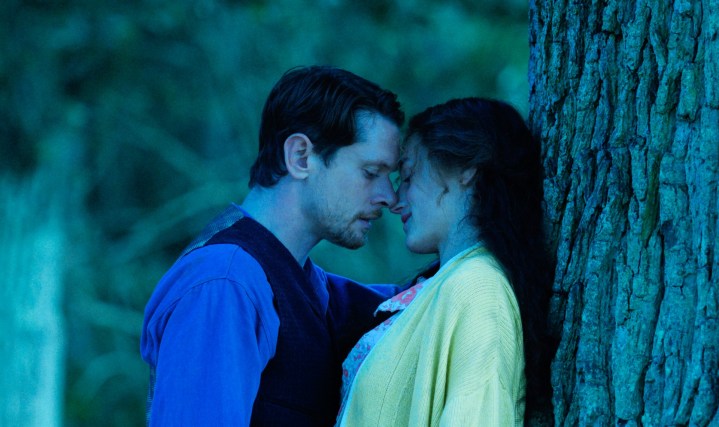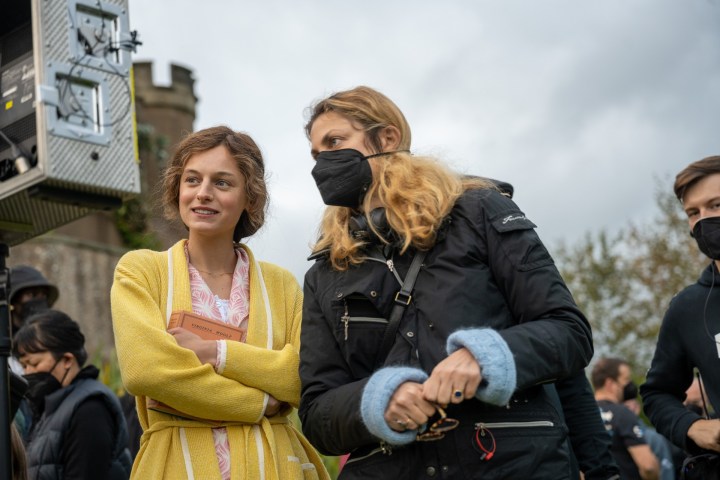Nearly a century ago, a book was published that scandalized almost the entire world. Lady Chatterley’s Lover is D.H. Lawrence’s classic tale of an unhappily married woman having an affair with her gardener. Banned in almost every country, it gained notoriety for its explicit sex scenes and radical notions of free love.
After numerous film and TV adaptations, Netflix has released a new interpretation for the #MeToo era. Starring The Crown‘s Emma Corrin and Unbroken‘s Jack O’Connell, this version is faithful to the book’s sensual spirit while also modernizing the premise of a woman struggling to gain control over her own body and will.
Digital Trends talked to the film’s director, Laure de Clermont-Tonnerre, about what attracted her to this particular adaptation, how she handled the book’s racy sex scenes, and why Lady Chatterley’s Lover is more relevant than ever.
Note: This interview had been condensed for length and clarity.

Digital Trends: What made you want to direct this version of Lady Chatterley’s Lover?
Laure de Clermont-Tonnerre: I received the script [from David Magee] in April of 2020, when the COVID-19 pandemic was just beginning and everyone was trapped in their homes. I had read the book before, but there was something very fresh about David’s script. I liked the emphasis on the resilience of the human connection and the importance of touch and sensuality.
That was something we were so deprived of at the time, and when I read the script, I felt connected to it. I also liked how this version told the story through Connie’s eyes and allowed the viewer to really get under her skin, which wasn’t present in the previous adaptations of this story.
As you just alluded to, Lady Chatterley’s Lover has been adapted before in various TV shows and films. Were you inspired by those versions before you started working on your own?
I saw the French version from 200,6 and I really liked it, but it was very intellectual and less sensual, I would say, than the book. The director, Pascale Ferran, focused more on the class and the intellectual relationship between Connie, Mellors, and Clifford [Connie’s husband].
It’s a beautiful film, but I didn’t see it again because I didn’t want to be influenced by anyone else’s interpretation. I just wanted to take my own fresh mind into it.

I feel like every adaptation of Lady Chatterley’s Lover lives or dies by who is playing Constance. How did you go about casting Emma Corrin in the lead role?
Well, I wanted to do something modern and relevant with this adaptation and make it feel like it’s 2022 even though it is a period piece. You could just get it completely wrong if it’s not the right person.
I had seen Emma’s work in The Crown, and there was something about her energy that was extremely here and now. It’s a real quality for an actor because they give this notion of the present, which Emma does so well. There’s an immediacy to her energy that kind of grabs you and reminds you that it’s today. It’s a singular energy that is not very common in other actors.
The novel is famous for its sexual content. What was your approach in shooting those intimate scenes between Emma and Jack? Did you have a concrete plan beforehand or did you rely on improvisation or a mixture of the two?
We did a lot of rehearsal. We had an intimacy coordinator on set, who was our guide through all the intimate scenes in the film. The most challenging thing was to understand the emotions behind Connie’s actions and what kind of story we wanted to tell. We didn’t want to do something gratuitous or redundant or boring, which is how most sex scenes are like.
It was important to me and to everyone to emphasize the body language between Emma and Jack. The importance of the characters’ sensuality is something that is so liberating and free in the book, so we wanted to give a very precise narrative and emotion behind every move, every touch, and every glance.

How is Lady Chatterley’s Lover still relevant today?
I think that it’s a story about the woman who takes ownership of her body, which is unfortunately still very timely. Lawrence’s novel was scandalous for its time, and it was banned for obscenity because the freedom of a woman’s body was completely unacceptable to most people.
Even today, the story is even more timely than it was a couple of years ago with what’s happening in Iran and the overturning of Roe vs. Wade in America. A woman’s body is still a subject of political tension. Lawrence’s message was that sensuality and sexuality are beautiful and pure. There’s nothing shameful and dirty about it.
Lady Chatterley’s Lover was and is a real celebration of life, and I think it was really modern, maybe too modern, for its time, but is all the more necessary in 2022. It’s extremely timely and relevant even if it was published a century ago.
Lady Chatterley’s Lover is now streaming on Netflix.



